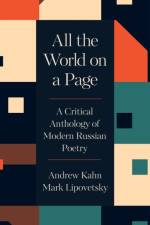av Andrew Kahn
495
The rich and ongoing development of Russian lyric poetry, explored through close readings of thirty-four poems by poets ranging from Alexander Blok to Maria StepanovaThe Russian cultural tradition treats poetry as the supreme artistic form, with Alexander Pushkin as its national hero. Modern Russian lyric poets, often on the right side of history but the wrong side of their country's politics, have engaged intensely with subjectivity, aesthetic movements, ideology (usually subversive), and literature itself. All the World on a Page gathers thirty-four poems, written between 1907 and 2022, presenting each poem in the original Russian and an English translation, accompanied by an essay that places the poem it its cultural, historical, and biographical contexts. The poems, both canonical and lesser-known works, extend across a range of moods and scenes: The poems, both canonical and lesser-known works, extend across a range of moods and scenes: Velimir Khlebnikov's Futurist revolutionary prophecy, Anna Akhmatova's lyric cycle about poetic inspiration, Vladimir Nabokov's Symbolist erotic dreamworld, Joseph Brodsky's pastiche of a Chekhovian play set on a country estate, Maria Stepanova's pandemic allegory of political repression, Galina Rymbu's energetic manifesto "My Vagina."An introduction explores the abiding inspiration of modernism on the Russian lyric tradition. The separate chapter essays, informed by extensive knowledge of the existing scholarship and critical styles of interpretation consider how the interplay of originality and tradition, form and voice work to engage the reader. The poems themselves, many of them in newly commissioned translations, operate outside state-mandated poetic styles to address the reader directly, "tête-à-tête," as Brodsky said in his 1987 Nobel lecture. With each chapter devoted to a different poem, All the World on a Page allows readers to experience the richness of Russian poetry through poems and poets.

